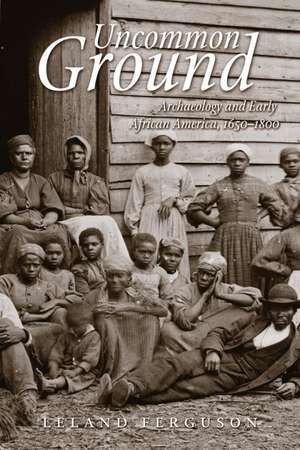Uncommon Ground: Uncommon Ground
Autor Leland Ferguson, L. Fergusonen Limba Engleză Paperback – 31 aug 2004
Preț: 159.43 lei
Nou
Puncte Express: 239
Preț estimativ în valută:
30.51€ • 31.47$ • 25.46£
30.51€ • 31.47$ • 25.46£
Carte indisponibilă temporar
Doresc să fiu notificat când acest titlu va fi disponibil:
Se trimite...
Preluare comenzi: 021 569.72.76
Specificații
ISBN-13: 9781560980599
ISBN-10: 1560980591
Pagini: 232
Ilustrații: 42 B&W PHOTOS, 37 B&W ILLS.
Dimensiuni: 145 x 238 x 14 mm
Greutate: 0.35 kg
Editura: Smithsonian Books
ISBN-10: 1560980591
Pagini: 232
Ilustrații: 42 B&W PHOTOS, 37 B&W ILLS.
Dimensiuni: 145 x 238 x 14 mm
Greutate: 0.35 kg
Editura: Smithsonian Books
Notă biografică
Leland Ferguson is Distinguished Professor Emeritus of Anthropology at the University of South Carolina, Columbia.
Recenzii
“The uncommon ground in the title of Ferguson's highly provocative book is that which yields up evidence of African Americans during the Pre-Revolutionary period. The discussion of archaelogocial findings that elucidate how these enslaved people actually lived is so surprisingly engaging and accessible that at times this reads like a detective story, with one tantalizing clue leading the author to yet another.”—Publishers Weekly
“Fascinating stuff . . . highly recommended.”—Library Journal
“An eloquent book that is both moving and scholarly.”—American Anthropologist
“A major analytical achievement. Through its bold proposition that slaves enjoyed ‘ideological power,’ [Uncommon Ground] offers a new and different model for analyzing plantation social relations.”—American Historical Review
“Fascinating stuff . . . highly recommended.”—Library Journal
“An eloquent book that is both moving and scholarly.”—American Anthropologist
“A major analytical achievement. Through its bold proposition that slaves enjoyed ‘ideological power,’ [Uncommon Ground] offers a new and different model for analyzing plantation social relations.”—American Historical Review
